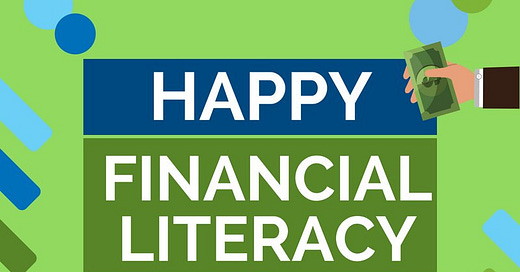Celebrating Financial Literacy Month and Using AI for Financial Decisions
Hey everyone,
This November marks the 14th edition of Financial Literacy Month in Canada. With that right around the corner, much of our content will be about it and what The Financial Consumer Agency of Canada (FCAC) has to say. You can find the link to their website here, but the information there can be too much if you don’t know what to look for. So read on for a breakdown of their website’s more useful tools and articles!
My top picks for articles and tools from the FCAC website:
Your first read should be on budgeting. It is the most important first step in getting control over your finances and planning. Read this and play around with the budget planner you’ll find inside the article.
It is also important to think about what to do if you happen upon a large amount of money. It could be an inheritance, a prize, severance, etc. Regardless of what it is, you should plan for it and this article talks about it. Spoiler: it is recommended you pay off your debts before anything else and after you’re done with your debt payments, investing is another great way to set yourself up for success in the future.
Rent and budgeting: In general, rent and household-related expenses should not be higher than 35% of household income before taxes. For more information on rent click here.
Credit cards are one of the most important tools in the finance world. You must pick the right one for you with the greatest amount of benefits based on your specific situation. Use the Credit Card Comparison Tool to find the one for you.
If you want to buy a home and want to set up mortgage payments, you should be ready to pay 20% of the price of the house upfront to avoid mortgage insurance and other extra payments. See the Mortgage Calculator for more information.
Plan for retirement and ask around work if they provide any pension plans.
And with that, I’m done with my compilation of articles and tools from the FCAC. But that doesn’t mean you shouldn’t browse it for yourself, though. In fact, I’m pretty sure I might’ve overlooked an article that is extremely relevant to you and your situation.
This year, FCAC says “Money on your Mind. Talk about it!”
“Research shows that talking about money builds financial confidence, and can lead to better financial outcomes. This is especially true for women.”
We at ScaleUp agree with the statement above and encourage Canadians to share their financial experiences and ask questions about money.
This month, the FCAC is challenging Canadians to try to do just one thing to boost their financial confidence, such as talking to a friend or coworker about budgeting and retirement, or asking a trusted financial professional for advice. During the FCAC campaign, Canadians can also engage in conversations on social media with #MoneyOnYourMind.
Can AI help me make better financial decisions?
This question has been on the minds of many for a while now but unfortunately, it’s one we still don’t have a concrete answer for.
AI tools are capable of providing insights into everything from budgeting to investment strategies. But how effective are these tools and should we trust them?
There are strengths and limitations we should be aware of before thinking about using it for personal finance. The biggest upside AI brings to the table is its ability to search and retrieve information. If you use Microsoft’s Co-Pilot for example, you can ask it to give you information on TFSAs and provide the sources so you can verify the information for yourself and that’s great! You’re using it to help you learn. But if you ask it which stock to buy to make you a millionaire the fastest way possible, then things might get weird.
These text-based AIs are capable of hallucinating, which means, they’re making stuff up. It’s a confident unjustified claim and sometimes, it can be difficult to tell when they’re doing so. My advice would be to always check the sources for these things.
Another way to use it to your advantage would be to copy an article, paste it into the chat, and ask it to explain to you as if you were 15, 10, or even 5 years old. These articles often use complicated wording and expressions that can hinder a person’s understanding of a subject and AI could remedy that.
Canadian banks and businesses are exploring AI’s use cases in their products, but most are restricted to the backend where customers don’t interface directly with it.
There is a wide range of AI-powered financial applications in the world right now, but they’re mostly limited to the US for regulation reasons. We shouldn’t worry though, soon enough banks will start offering AI products to clients and regulations will adapt to the innovation.
I read these great articles(1)(2)(3) on the subject and would recommend them to readers looking for a more in-depth discussion.








